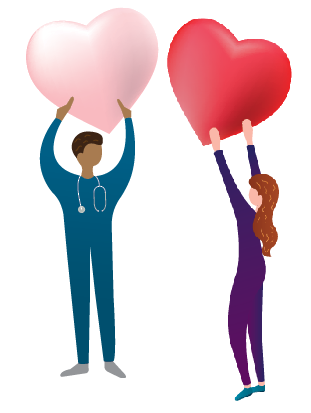Don’t Skip a Beat – Prepare for Heart Attacks

Know the risks. Be educated about the risks you and your loved ones face. Certain behaviors and conditions can increase your risk for a heart attack, including smoking, having uncontrolled high blood pressure, being overweight, and eating an unhealthy diet.
Have a heart-to-heart. Engage friends, family members, and loved ones in a conversation about heart attack risks, and discuss what you can do together to prevent a heart attack. You might learn that you can help someone live a healthier life by taking them grocery shopping, driving them to medical visits, or reminding them to take their medicines.
Recognize the signs. Heart attacks look and feel different in women than they do in men. Both men and women may feel chest pain when having a heart attack, but women are more likely to also experience shortness of breath, nausea or vomiting, and pain in the back, neck, or jaw. About 1 in 5 heart attacks are called “silent” heart attacks, which means you’re having a heart attack but don’t know it.
Heart attack symptoms may include:
- Chest pain or discomfort, usually in the center or left side of the chest, that lasts for more than a few minutes or that goes away and comes back. The discomfort can feel like uncomfortable pressure, squeezing, fullness, or pain.
- Feeling weak, light-headed, faint, or a cold sweat.
- Pain or discomfort in the jaw, neck, or back.
- Pain or discomfort in one or both arms or shoulders.
- Shortness of breath.
Be safe, not sorry. Many heart attacks start slowly with relatively mild pain. Make an agreement with loved ones that you will call 911 as soon as anyone experiences any of the signs of a heart attack. Don’t hesitate: acting fast can save a life.
Write down important information. Keep a record of what medicines your loved ones are taking, what medicines they’re allergic to, and who they would want to have contacted in case of an emergency.
Focus on prevention. You can help prevent heart attack from happening by eating healthfully, getting enough physical activity, not smoking, staying at a healthy weight, and managing other health conditions like high blood pressure, high blood cholesterol, and diabetes.
Reach out to your loved ones on World Heart Day, September 29, and commit to making these healthy changes together. Being prepared now may just save a life later.
Source: cdc.gov
![Twin Rivers Nursing & Rehabilitation [logo]](https://www.twinriversnursing.com/wp-content/uploads/sites/108/2017/05/logo.png)